Waste Management Roll-Off Services and How They Work
Waste management roll-off truck services simplify large project cleanups with efficient, affordable dumpster rentals for construction and renovation debris.
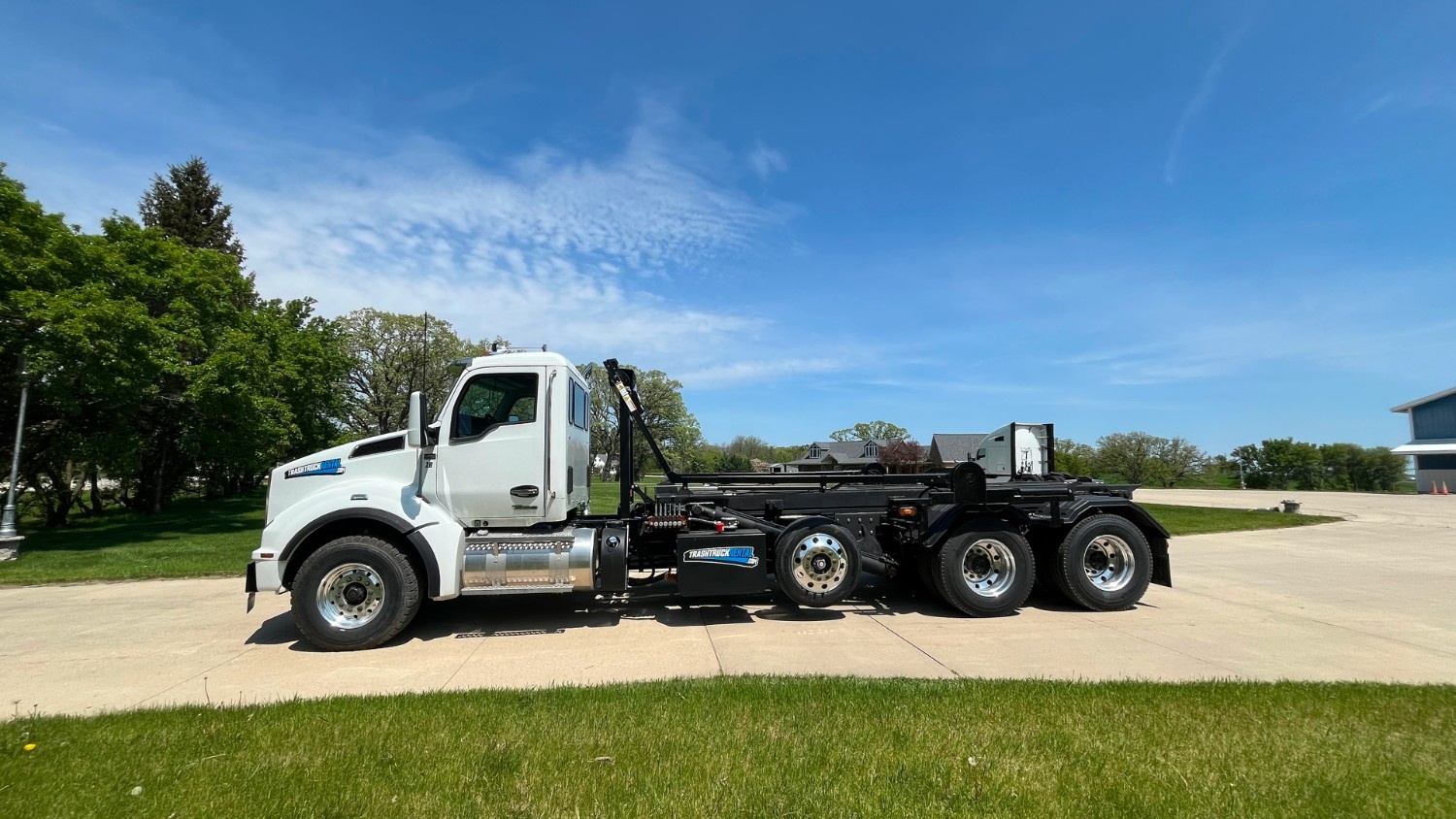
Waste management roll-off truck services simplify large project cleanups with efficient, affordable dumpster rentals for construction and renovation debris.

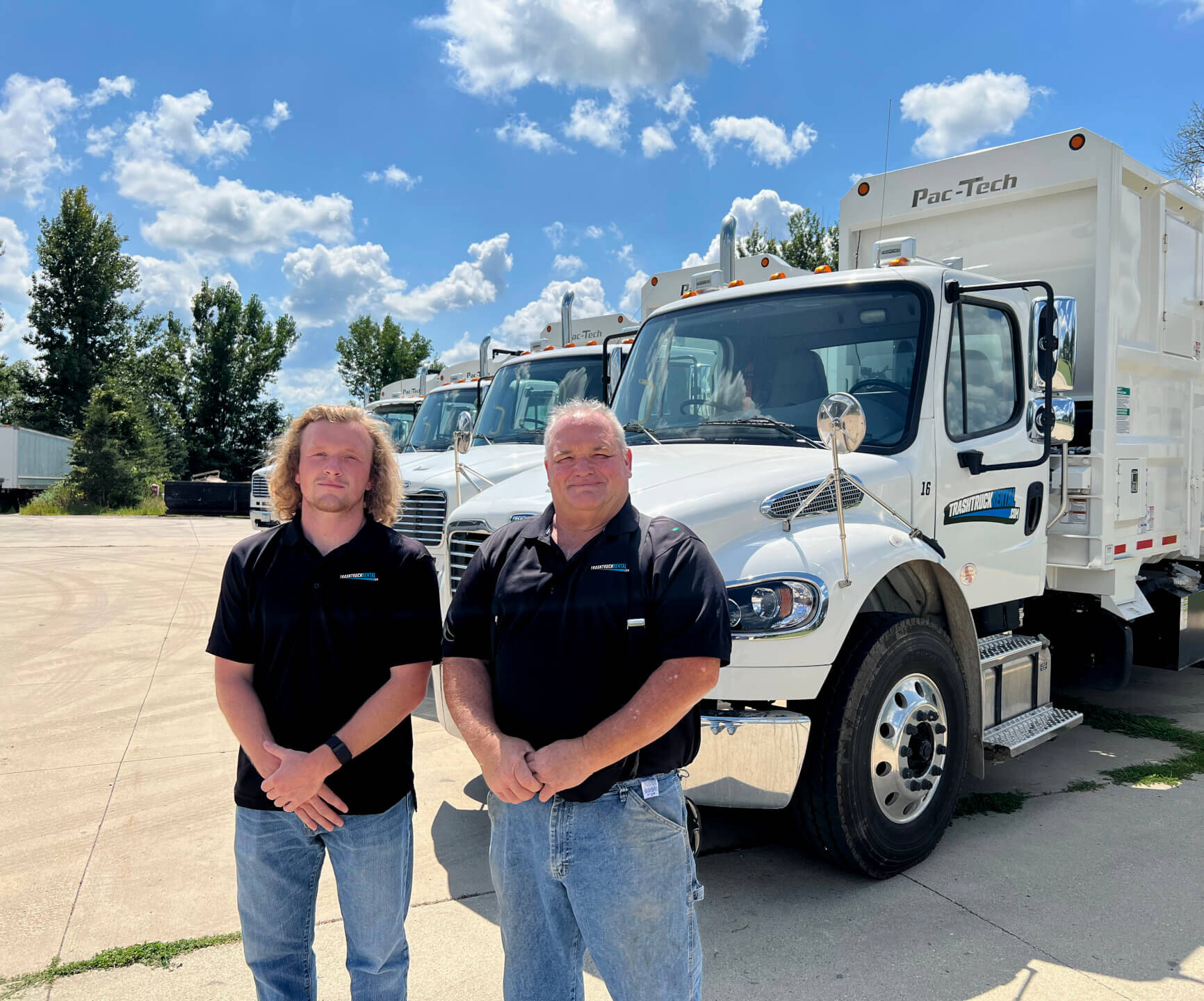
You're standing in front of a major project, whether it's a home renovation, a significant cleanout, or a new construction build. You're ready to get to work, but one big question looms: "How am I going to get rid of all this waste?" It's a common challenge, and if you've ever felt haunted by the sheer volume of debris, you're not the only one. In the US, the average person generates about 4.9 pounds of trash per day, and a single construction project can multiply that number exponentially.
The solution lies in a specialized service that provides the muscle you need to tackle any large-scale cleanup: a waste management roll-off truck service. This guide will walk you through everything you need to know, from choosing the right size to understanding the costs and logistics so that you can manage your project efficiently and without stress.
At its core, a roll-off dumpster service is a simple yet powerful solution for managing large amounts of waste. A specialized garbage roll-off truck delivers a large, rectangular container to your job site or home. The truck uses a hydraulic system to "roll" the dumpster off its bed and place it exactly where you need it. Once you've filled the container with your debris, the truck returns to pick it up and haul it all away for proper disposal.
These services are designed for temporary projects that generate more waste than a standard residential or commercial trash bin can handle. This includes everything from home remodels and roof replacements to major construction and demolition work.
Now that you understand the mechanics of the service, let's explore why it's the ideal solution for large-scale waste management.
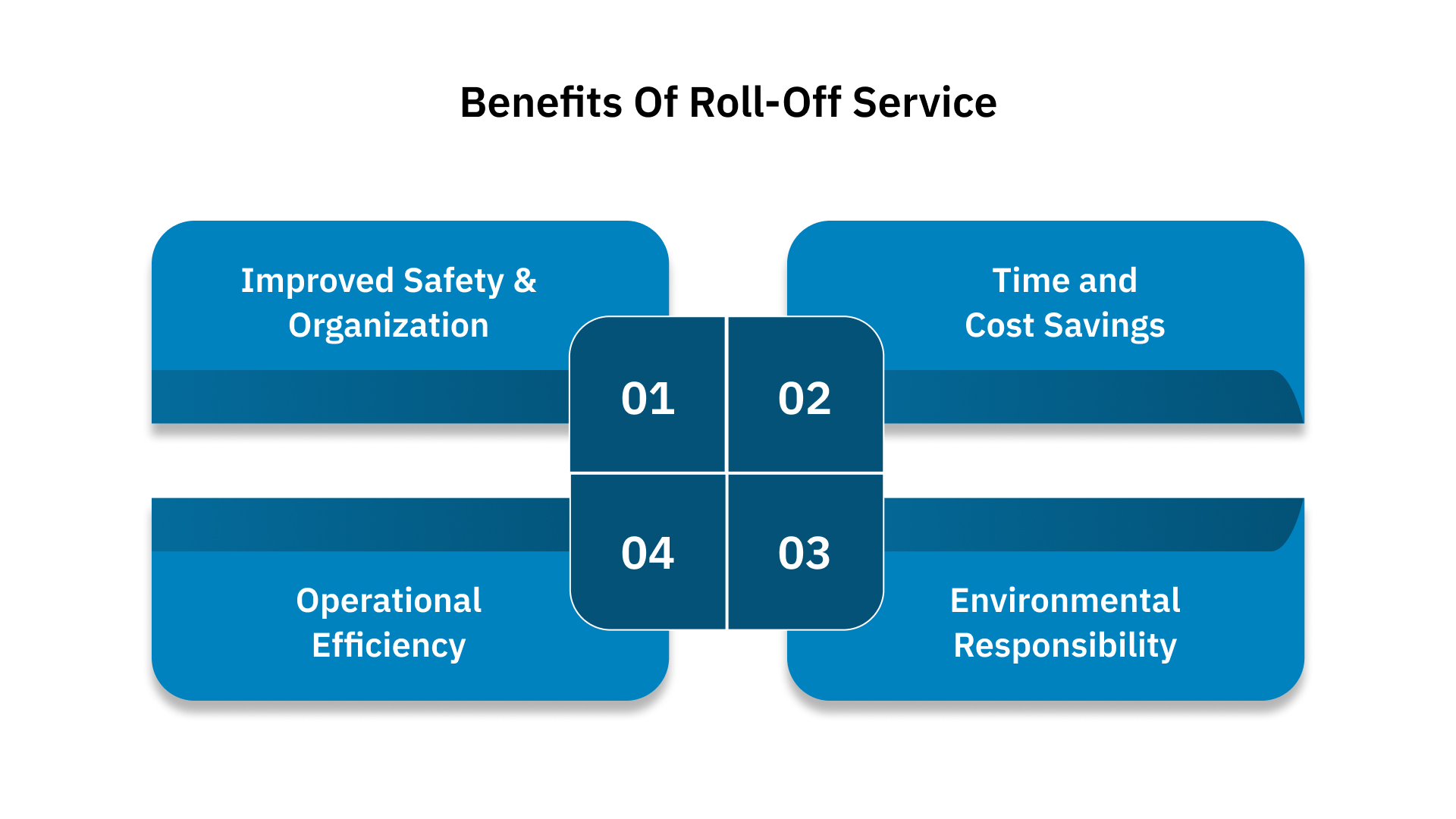
Using a roll-off service is more than just a convenience; it’s a strategic choice that can dramatically improve your project’s efficiency, safety, and bottom line.
The advantages of a roll-off service are clear, but which industries find them most valuable for day-to-day operations? Let’s find out.
Also Read: Roll-Off Trucks: What They Are and How They Work
The versatility and heavy-duty capacity of roll-off trucks make them essential for a wide range of industries that generate large volumes of waste. Here are some of the sectors that rely on these services to keep their operations running smoothly.

Now that you know what a roll-off dumpster service is and how it simplifies waste management, it’s worth looking at the trucks behind the service.
Not all roll-off trucks are the same. Understanding the different types can help you better manage your project and evaluate your service provider’s capabilities. The main difference comes down to the mechanism used to load and unload the container.
Beyond the truck itself, a crucial part of the service is choosing the correct container for your project.
Also Read: A Guide to Different Types of Garbage Trucks
Choosing the right dumpster size is the most crucial decision you'll make. A container that's too small will require an extra, costly pick-up, while one that's too big means you're paying for unused space. Roll-off dumpsters are measured in cubic yards, which is a measure of volume. To make it easy to understand, here's a breakdown of standard sizes and their typical uses, often compared to the number of pick-up truck loads they hold.
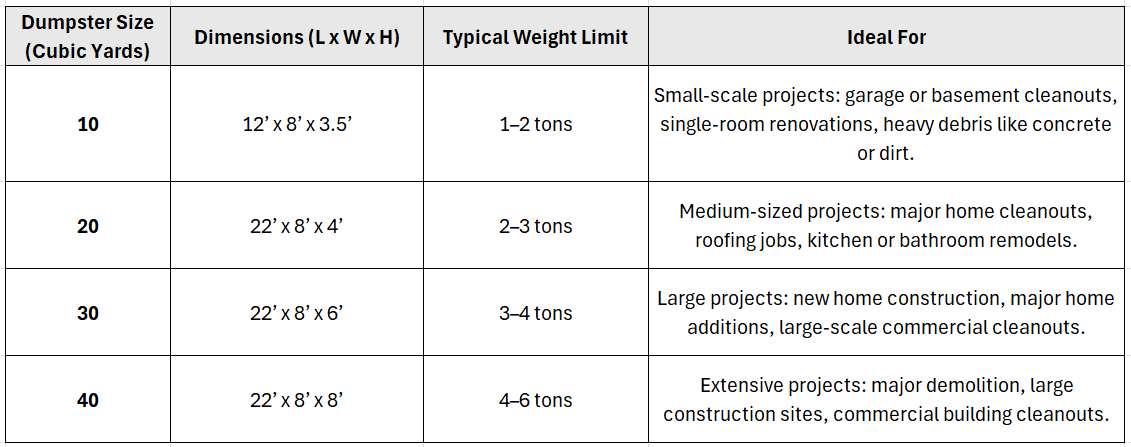
The 20-yard dumpster is often considered the most popular and versatile choice, offering a good balance of capacity and a manageable footprint for many residential projects.
With a clear picture of the available sizes, it’s time to focus on the factors that will help you make the right choice for your specific needs.
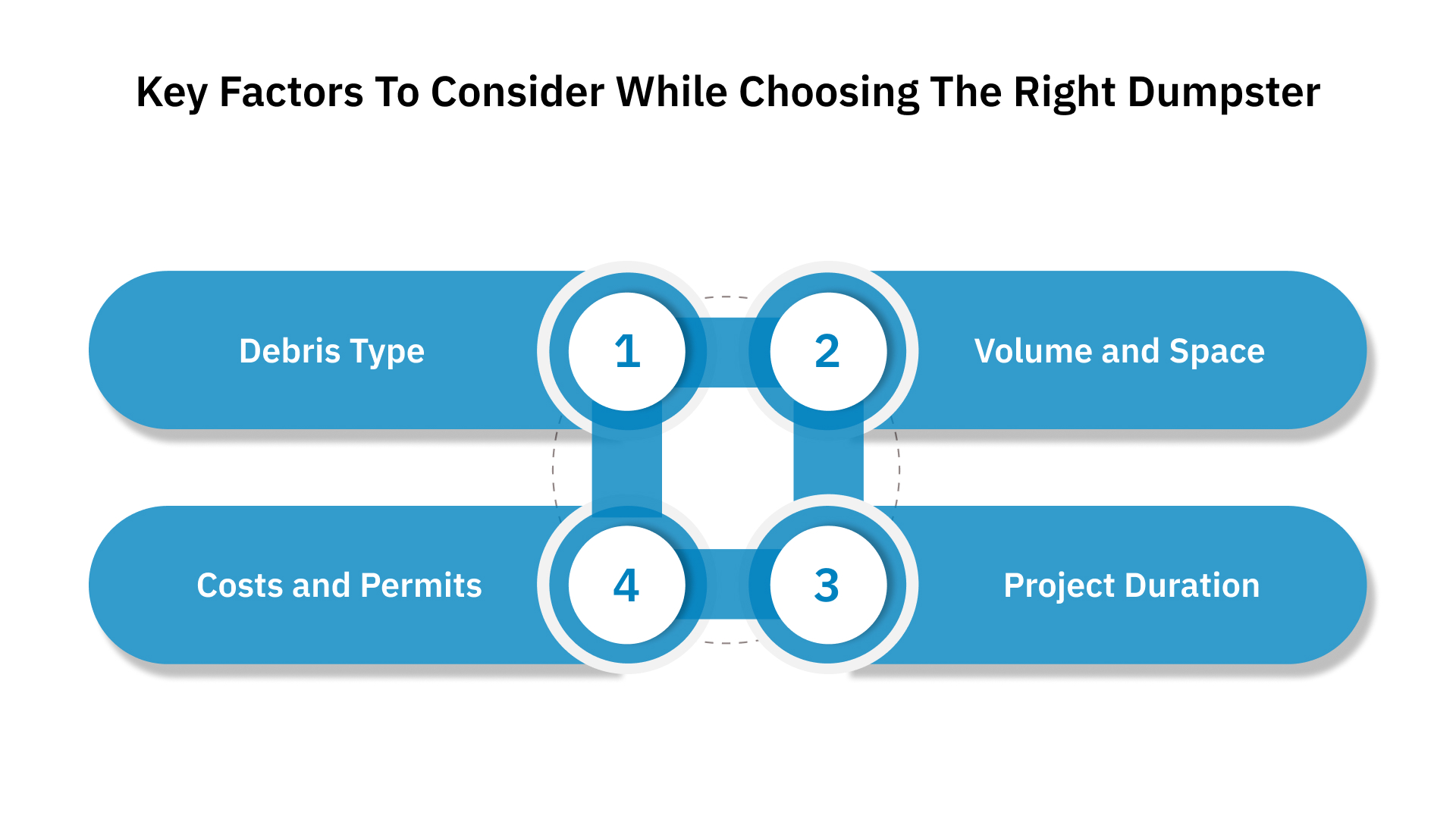
Selecting the right dumpster size for your project is about more than just a quick guess. To avoid headaches and extra costs, consider these key factors before you rent.
What are you throwing away? The type of material is just as important as the amount. For example, heavy materials like concrete, asphalt, dirt, or brick can cause a dumpster to reach its weight limit long before it’s full. For these types of jobs, a smaller 10-yard or 20-yard dumpster is often a safer and more economical choice. For lighter, bulkier items like furniture, yard waste, or construction debris, a larger container is a great option.
It can be hard to visualize how much space your debris will take up. A good rule of thumb is to compare the volume to standard pick-up truck loads. A 10-yard dumpster, for instance, holds about 3-5 pick-up truck loads, while a 40-yard dumpster can hold up to 16. Also, think about the space you have available. The delivery area needs to be at least 60 feet long and 10 feet wide, with 20-25 feet of overhead clearance to accommodate the truck and the dumpster’s placement.
How long will your project take? Most roll-off services offer a standard rental period, typically around 7 to 14 days. If your project is a quick, weekend-long cleanout, a smaller dumpster might be sufficient. For larger, longer-term construction jobs, you’ll want to ensure your rental period is flexible enough to accommodate your timeline.
When you’re planning your budget, it’s essential to understand the different costs associated with renting a roll-off dumpster. The total price is usually a combination of several factors.
You may need a permit if placing the dumpster on public property like a street or sidewalk, but usually not if it’s on your private driveway. Check with your local municipality and allow a few days for approval. Also, knowing what can’t go in the dumpster is just as important as knowing what can to avoid fines and ensure safety.
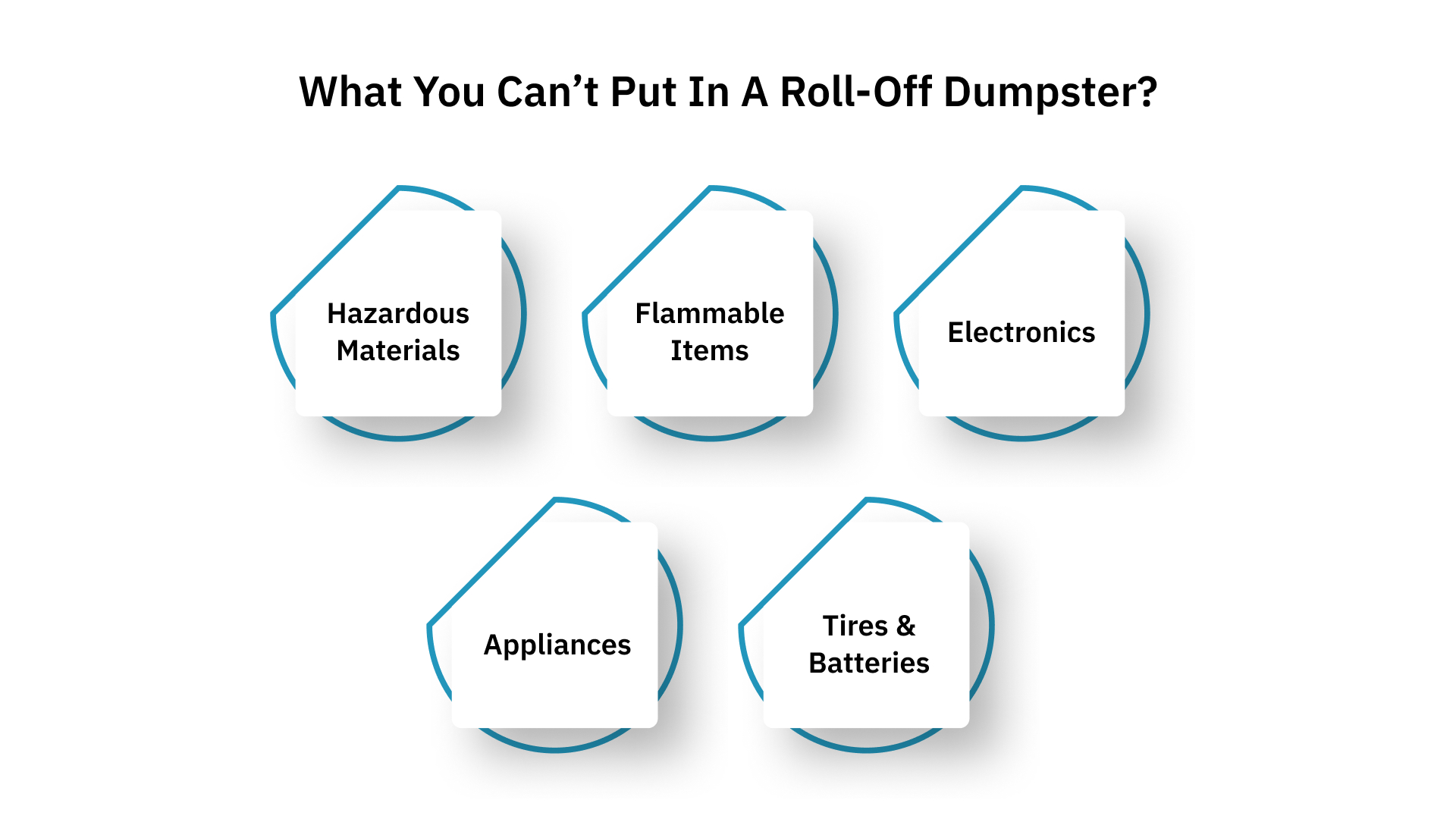
While roll-off dumpsters are significant for most types of waste, there are some materials that are universally prohibited for safety and environmental reasons. These include:
1. Hazardous Materials: This includes paints, solvents, motor oils, chemicals, and pesticides.
2. Flammable Items: Propane tanks, gasoline, and other combustible materials are not allowed.
3. Electronics: TVs, computers, and other electronics often need to be recycled separately due to hazardous components.
4. Appliances: Items with Freon, like refrigerators and air conditioners, are typically restricted.
5. Tires and Batteries: These items require special disposal procedures.
While the rules of what you can and can’t toss are firm, the industry itself is always evolving with new technologies and innovations.
The waste management industry is constantly evolving, and roll-off services are no exception. Modern providers are leveraging technology to improve efficiency and customer experience.
Innovations are important, but nothing replaces the value of a well-maintained roll-off truck when it comes to consistent service.
.jpg)
For fleet managers and business owners, a waste management roll-off truck is a significant investment. Proper maintenance is the single most important factor in extending its service life, preventing costly breakdowns, and ensuring maximum operational uptime.
After putting in the effort to keep your roll-off truck running smoothly, the next step is choosing a service partner who values that same level of care and reliability.
Taking on a significant cleanout or construction project comes with plenty of moving parts, and managing the waste is one you can't afford to overlook. You understand the value of working with a dependable team. Choosing a roll-off service that's reliable, efficient, and aligned with your needs helps keep your project running smoothly from start to finish.
We at Trash Truck Rental understand the challenges you face, which’s why our solutions are tailored to meet your needs, whether you're a project manager or a COO. We focus on making waste management straightforward and reliable, offering clear, cost-effective options you can trust.
We’re based in Minnesota, Wisconsin, and Iowa, where we’ve built a reputation as a community-focused partner with 20 years of experience. We also provide truck sales nationwide.
Tackling a major cleanout or construction project can feel like a huge undertaking, but it doesn’t have to be overwhelming. By understanding the essentials of a waste management roll-off service, you can choose the right size, plan for logistics, and avoid unexpected costs. A well-informed approach keeps your project on track and ensures waste is handled safely and efficiently.
At Trash Truck Rental, we’re here to make that process easier. Partnering with us means you’re not just renting a dumpster, you’re securing a dependable part of your project’s success. If you’d like guidance in finding the right solution, contact us today.
A regular garbage truck with a compactor collects waste from multiple bins on a designated route. A roll-off truck, however, is a specialized vehicle that transports a large, temporary dumpster to a single location for a major cleanout project, then hauls the entire filled container away.
To avoid overage fees, you must be mindful of the weight limit for your specific dumpster size. For projects involving heavy materials like concrete or dirt, it’s often safer to rent a smaller container with a higher weight allowance. Discussing your project’s materials with your service provider upfront can help you choose the right container.
You typically do not need a permit to place a roll-off dumpster on your private property, such as your driveway. However, you will almost always need a license from your local municipality if you plan to place the dumpster on a public street or any other right-of-way.
After a roll-off truck picks up your filled dumpster, the waste is transported to a designated facility. This could be a landfill, a recycling center, or a transfer station, depending on the type of waste and the local regulations.
When choosing a provider, look for one that offers transparent and flexible pricing, a reliable fleet of trucks, and responsive customer service. A company with a strong reputation for professionalism and a focus on your specific project needs is a reliable choice.
Ready to Upgrade Your Process Operations?